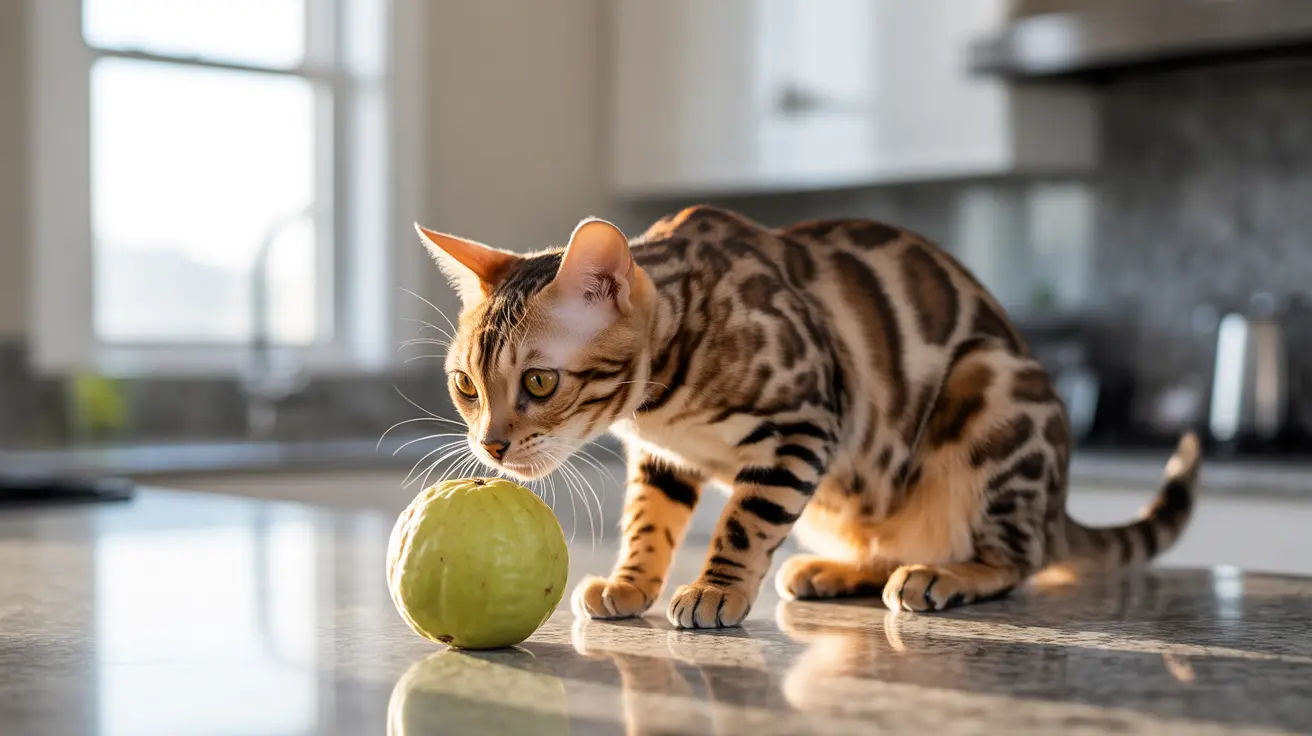As cat owners increasingly explore diverse treat options for their pets, questions about feeding human foods like guava to cats have become more common. While cats are obligate carnivores, meaning they primarily need meat-based nutrition, many wonder if tropical fruits like guava can be a safe occasional treat for their feline friends.
In this comprehensive guide, we'll explore the safety, benefits, and potential risks of feeding guava to cats, helping you make an informed decision about including this tropical fruit in your cat's diet.
Safety and Basic Guidelines for Feeding Guava to Cats
Guava is not toxic to cats and can be offered as an occasional treat in very small amounts. However, there are several important safety considerations to keep in mind:
Always remove seeds before offering guava to your cat, as they pose choking and digestive blockage risks. Serve only fresh, ripe guava pieces, and avoid processed guava products that may contain added sugars or preservatives.
Portion control is crucial - limit servings to tiny pieces no more than a few times per week, always with veterinary approval.
Nutritional Benefits and Limitations
While guava offers several nutrients, it's important to understand that cats process these differently than humans:
- Fiber content can support digestion when offered in small amounts
- Antioxidants may provide cellular protection
- Potassium supports muscle and nerve function
- Vitamin C, while abundant in guava, isn't necessary for cats as they produce their own
However, cats lack the digestive enzymes to properly process large amounts of fruit, making guava more of a treat than a nutritional supplement.
Potential Risks and Concerns
Despite being non-toxic, guava can pose certain risks to cats:
- High sugar content may contribute to obesity and dental issues
- Excessive consumption can cause digestive upset
- Natural oxalates might affect urinary health if consumed frequently
- Pectin could cause constipation in large amounts
Special Considerations for Certain Cats
Some cats should avoid guava entirely, including:
- Diabetic cats
- Overweight cats
- Cats with sensitive digestive systems
- Those with existing urinary issues
How to Safely Introduce Guava to Your Cat
If you decide to offer guava to your cat, follow these steps:
- Consult your veterinarian first
- Start with a tiny piece (smaller than a dime)
- Monitor for any adverse reactions
- Wait 24 hours before offering more
- Discontinue if any negative symptoms occur
Frequently Asked Questions
Can cats safely eat guava, and how much is appropriate?
Yes, cats can safely eat guava in very small amounts. A piece no larger than a dime, offered 1-2 times per week maximum, is appropriate after veterinary approval.
What are the potential digestive risks of feeding guava to cats?
Potential risks include diarrhea, constipation, vomiting, and general digestive upset, especially if fed in large quantities or too frequently.
Should guava seeds be removed before giving guava to my cat?
Yes, always remove guava seeds before feeding the fruit to your cat, as they pose choking hazards and can cause intestinal blockages.
Are there any health benefits of guava for cats despite them being carnivores?
While cats don't require guava nutritionally, small amounts may provide some benefits through fiber and antioxidants, though these are minimal compared to their regular diet.
What signs indicate my cat may have an adverse reaction after eating guava?
Watch for vomiting, diarrhea, lethargy, loss of appetite, or excessive drooling. If you notice any of these symptoms, discontinue guava and contact your veterinarian.
Conclusion
While cats can safely consume small amounts of guava as an occasional treat, it's essential to remember that this fruit should never replace their regular meat-based diet. Always consult with your veterinarian before introducing any new foods, and monitor your cat carefully for any adverse reactions.
The best approach is to stick primarily to veterinary-approved cat treats and maintain a balanced, species-appropriate diet that meets all your cat's nutritional needs.






